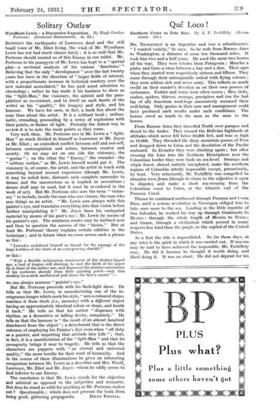Ma. TSCHIFFELY is an Argentine and was a schoolmaster. "
I wanted variety," he says. So he rode from Buenos Aires to Washington, a distance of some ten thousand miles. It took him two and a half years. He used the same two horses all the way. They were Creoles from Patagonia : Mancha a pinto, and Gato a cross between a bay and a dun. Their ages when they started were respectively sixteen and fifteen. They came through their unimaginable ordeal with flying colours ; they were seldom sick and never sorry. This reflects as much credit on their master's devotion as on their own powers of endurance. Fodder and water were often scarce ; flies, ticks, snakes, spiders, thieves, swamps, precipices and (on the last lap of all) American road-hogs successively menaced their well-being. Only genius in their care and management could have produced such results under such conditions. The horses owed as much to the man as the man to the horses.
From Buenos Aires they travelled North over pampas and desert to the Andes. They crossed the Bolivian highlands at altitudes which never fell below 10,000 feet, and rose as high as 18,000. They threaded the dizzy mountain passes of Peru and dropped down to Lima and the desolation of the Pacific seaboard. In Ecuador they were climbing again ; but after crossing the Line into the Northern Hemisphere near the Colombian border they were back on sea-level. Swamps and virgin forest, almost entirely unexplored, make the northern regions of Colombia utterly impassable except, precariously, by boat. Very reluctantly, Mr. Tschiffely was compelled to abandon terra firma (though its claim to the adjective is opeh to dispute) and make a short sea-crossing from the Colombian coast to Colon, at the Atlantic end of the Panama Canal.
Thence he continued northward through Panama and Costa Rica, until a serious revolution in Nicaragua obliged him to take once more to the sea. Landing in the little republic of San Salvador, he worked his way up through Guatemala to Mexico : through the whole length of Mexico to Texas ; and thence, through a civilization which proved in many respects less kind than the jungle, to the capital of the United States.
As a feat the ride is unparalleled. So (in these days, at any rate) is the spirit in which it was carried out. If anyone may be said to have achieved the impossible, Mr. Tschiffely may. He did it because he thought it worth doing, and liked doing it. It was no stunt. He did not depend for his
-sueeess on the dare-devil's' luck, ribr did he Court the dare- -devil's rewards. Strength, gallantry and wisdom are qualities of which a mere glance at the map assures us that he was the possessor in an extraordinary degree. But he tells his.story 'without self-consciousness, in a level, deprecating voice, ..betraying scarcely even a legitimate pride in his deeds, trans- cribing with a meticulous honesty the fruits of his observation. - In an age prompt to vulgarize adventure for profit, Mr. 'Tschiffely stands out as something of a freak.
The critic can hardly claim to speak with authority of a 'book eighty per cent. of whose subject-matter deals with 'places which hardly anyone has ever been to. But it happens 'that the present writer can follow Mr. Tschiffely over a short part of his trail, along the shores of Lake Atitlan in Guatemala, 4,500 feet above sea-level---" one of those sights that will -always live in my memory." Here is a chance for a purple .patch, I could not help thinking, remembering wild stories about the little gaily kilted drunken Indians on the slopes of those volcanoes, the horrific legends which the German inn- keeper (Mr. Tschiffely stayed three days with him) delighted 'to retail. But Mr. Tschiffely turned down a chance out of which nothing short of illiteracy could have prevented the average traveller from making capital. He recorded only 'what he saw, and that (as I can vouch) faithfully ; then he 'rode on for Mexico, leaving a rich vein of rumour, legend, and 'exaggeration to be exploited by the next corner.
The number of people who could have done what this man did is tiny : the number of people who could have written about it as he has is tinier still. Everyone ought to read his book. Its only defect is the publisher's map, which is covered with beastly little pictures of llamas and crocodiles, and looks like wall-paper in the playroom of a self-educational estab- lishment for children under six years of age.
PETEE FLEMING.







































 Previous page
Previous page